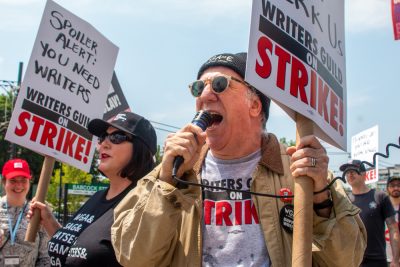On Sept. 25, 148 days after the Writers Guild of America began striking against the Alliance of Motion Picture and Television Producers, budding screenwriter Helena Bofise was playing a board game in her friend’s apartment.
She was utterly engrossed in the game — so much so that she wasn’t on her phone. From the couch, her roommate screamed at Bofise to check her notifications.

The WGA and AMPTP had reached a tentative agreement.
Bofise, a junior in the College of Communication and an international student, “literally couldn’t believe it.” She was shocked, optimistic and, most importantly, relieved that she would be better able to find work upon graduation and keep her visa.
“It’s been so clear that [the WGA was] not going to stop unless something good comes up,” she said.
The 148-day strike was one of the longest in the Guild’s history, and its impacts were felt on every level — including aspiring creatives like Bofise and recent graduates. Work in the industry, even at the entry level, has been extremely limited since May, just weeks before college graduations.
The WGA and AMPTP’s agreement included a viewership-based streaming bonus, increased health and pension benefits and AI safeguards, among other provisions.
But before it was reached, Bofise was growing anxious.
Originally from Italy, she moved abroad due to the wealth of film opportunities the U.S. could offer her. Bofise was concerned she made a mistake, as her visa’s time restrictions gave her a limited grace period after graduation to find full-time work.
Amid the strike, when faced with the “go big or go home” ultimatum, she was beginning to think she’d have to choose the latter.
“Finding the job, I think, is the hardest thing back home,” Bofise said. “But if finding a job here, right now, is just as hard, it almost feels like I could have stayed a lot closer to home and found myself in a similar situation anyway.”
For Felipe Torres Medina, a 2015 COM graduate who currently works as a staff writer on “The Late Show with Stephen Colbert,” the strike signaled a “mental switch.” Instead of going to work each day, he’d be going to the picket line.
At first he was scared, then frustrated at how few of the Guild’s demands the AMPTP had discussed — let alone accepted. When Torres Medina arrived on his first picket line, though, those feelings of “nervousness got replaced with infectious solidarity,” when he saw the community he had joined. It was a “heartwarming and truly beautiful” kind of support, he said.
On the West Coast, Ethan Dale, a junior at Emerson College studying comedic arts who is spending his fall semester in his hometown of Los Angeles, was uneasy about getting on the picket lines. Since he isn’t a Guild member, he wasn’t sure if it was his place to picket, but he was “welcomed with open arms.”
“I feel like in the last two years in college, everybody’s very itching to go, so it’s hard in that sense, but overall, I feel like if I can look at the bigger picture, I’m more confident going into the industry,” Dale said.
Bofise finds the strike has managed to impact her studies. It diverted her focus for a few key reasons. The first: Working in the industry at the moment comes with “a lot of anxieties.”
“Psychologically, it’s a little hard to keep your mind fixed on this when you know that there’s a strike going on and all this crazy stuff happening,” Bofise said.
The second: seeing many of her peers, such as Alyssa Winn, who graduated from COM’s film program this past spring, enter the workforce at a difficult time.
“It’s definitely a difficult time to graduate from film school,” Winn said.
For now, Winn is focused on taking time to “be a human,” and take jobs that will introduce her to different kinds of people, allow her to travel and help avoid “twiddling [her] thumbs.”
“If you want to be a filmmaker or storyteller in any capacity … then the most important thing you can do is just live your life, which sounds really annoying and stupid, but it is true,” Winn said. “If you’re just going to be on set all the time, I don’t know what kind of stories you’re going to be writing.”
That humanity is essential to Torres Medina. In terms of the impact of AI on the industry, he said he believes only humans can truly be creative.
“The genius of writing and the human experience is the empathy you feel when someone describes how you feel because they felt it,” he said.
With the new deal announced, Torres Medina has the same hope for the industry that he always has had: that it can tell “all kinds of stories written by all kinds of people.”
“If things had remained the way that they were, writing would become an increasingly more exclusionary career where you would need to have capital,” Torres Medina said. “It would be a side gig or hobby, not a career.”




























































































































